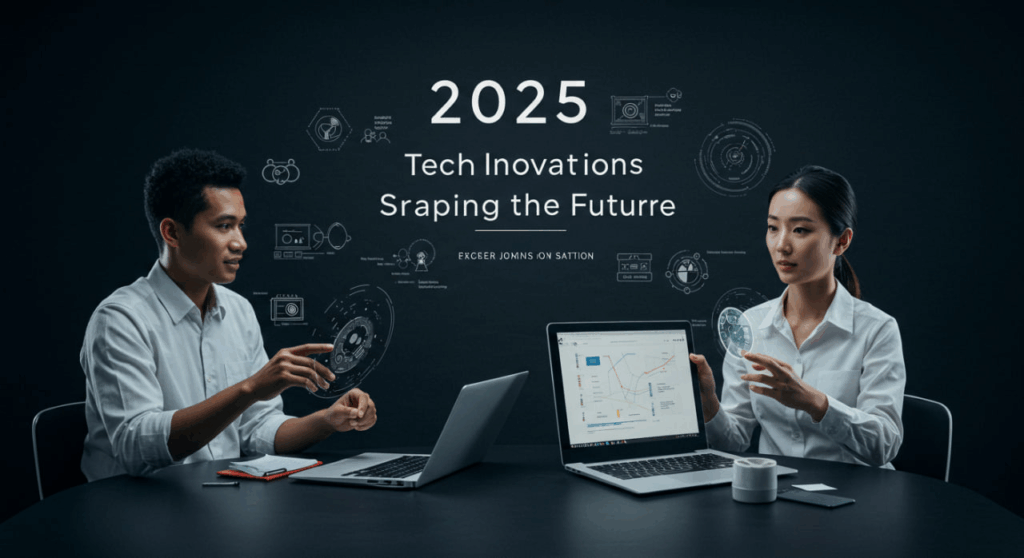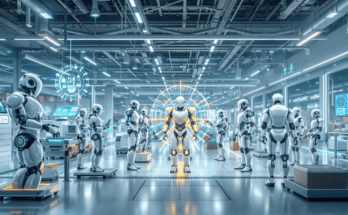As we step into 2025, the world of technology is evolving at an unprecedented rate. The advancements we’re witnessing today are setting the stage for a future where tech innovations will revolutionize industries, enhance our daily lives, and solve some of the most pressing challenges facing humanity. From artificial intelligence to quantum computing, emerging technologies are poised to make a huge impact across various sectors. In this blog post, we’ll explore some of the most exciting tech innovations that are shaping the future and how they will transform our world.
1. Artificial Intelligence (AI) and Machine Learning: The Rise of Smarter Systems
AI has already made waves in various industries, but in 2025, we can expect even more remarkable breakthroughs. Machine learning algorithms are becoming more powerful, enabling systems to learn and adapt at incredible speeds. Businesses will be able to implement AI-driven solutions in everything from customer service chatbots to predictive analytics and automation. The rise of generative AI models will also change the way we approach content creation, design, and problem-solving, giving us tools to accomplish more with less effort.
Key Trends in AI for 2025:
- Hyper-personalized experiences for consumers in sectors like e-commerce and entertainment.
- Autonomous systems in industries such as healthcare, transportation, and finance.
- Ethical AI frameworks to ensure fairness and transparency in decision-making processes.
2. Quantum Computing: Unlocking New Frontiers in Problem-Solving
Quantum computing is one of the most anticipated tech innovations of 2025. While still in its early stages, quantum computing has the potential to solve complex problems that classical computers cannot. By harnessing the principles of quantum mechanics, quantum computers could revolutionize fields like cryptography, drug discovery, climate modeling, and more. In 2025, we expect to see major breakthroughs that will push quantum computers closer to practical applications, offering a glimpse of how they might transform industries in the near future.
What Makes Quantum Computing Unique?
- It uses quantum bits (qubits) that can exist in multiple states simultaneously, allowing for massive computational power.
- It has the potential to dramatically speed up processes like data encryption and problem-solving in fields like logistics and artificial intelligence.

3. 5G and Beyond: A New Era of Connectivity
By 2025, 5G will be fully deployed across many parts of the world, ushering in an era of ultra-fast connectivity that will enable the next wave of technological advancements. With speeds up to 100 times faster than 4G, 5G will enable real-time communication, support the growing Internet of Things (IoT), and power new innovations in fields like autonomous vehicles, smart cities, and remote healthcare. But the evolution doesn’t stop with 5G. Researchers are already working on 6G technology, promising even faster speeds, greater efficiency, and more reliable global connectivity.
What 5G Will Enable in 2025:
- Seamless virtual and augmented reality experiences.
- Rapid advancements in remote surgery and telemedicine.
- A boost in IoT devices, allowing for smarter homes and cities.
4. Biotechnology and Gene Editing: Revolutionizing Medicine
Biotechnology is another frontier that is advancing rapidly in 2025. With the rise of CRISPR technology and other gene-editing tools, scientists are now able to make precise changes to DNA, opening up possibilities for curing genetic diseases, enhancing human capabilities, and even preventing future health problems. In 2025, we can expect significant progress in personalized medicine, where treatments are tailored to an individual’s genetic makeup. Additionally, biohacking and wearable health technology will allow people to monitor their health in real time and take proactive steps to improve their well-being.
Key Developments in Biotechnology for 2025:
- Advancements in gene therapy for diseases like cancer and genetic disorders.
- Personalized medicine that targets the specific needs of an individual based on their DNA.
- Wearable devices that can predict health issues before they occur.
5. Space Exploration and Commercial Space Travel: Reaching New Heights
Space exploration is entering a new era, with both government and private sector companies leading the charge. By 2025, space tourism will no longer be a dream, and the potential for commercial space travel will be more accessible than ever. Companies like SpaceX and Blue Origin are working on technologies that will enable private citizens to travel into space, while new innovations in rocket propulsion and satellite technology will make space more interconnected. In addition to space tourism, we’ll likely see further exploration of Mars and the Moon, laying the groundwork for future colonization.
Exciting Developments in Space for 2025:
- Commercial space travel becoming a reality for private individuals.
- Continued research and missions to Mars, with human exploration potentially on the horizon.
- Advancements in satellite technology for global communication and Earth monitoring.
6. Blockchain and Decentralized Finance: The Future of Secure Transactions
Blockchain technology, best known for powering cryptocurrencies like Bitcoin, is gaining traction across a variety of industries. In 2025, we expect to see the widespread adoption of blockchain for secure, transparent, and decentralized transactions. Beyond finance, blockchain will be used for applications in supply chain management, digital identity, and secure voting systems. Decentralized finance (DeFi) is already transforming traditional banking, and by 2025, it may become a mainstream option for individuals and businesses alike.
What to Expect in Blockchain by 2025:
- Widespread adoption of decentralized finance solutions.
- Blockchain applications for voting systems, real estate transactions, and healthcare records.
- Improved scalability and security in blockchain networks.
FAQs: Tech Innovations in 2025
What are the key technologies to watch in 2025?
Artificial Intelligence (AI), Quantum Computing, 5G networks, biotechnology (including CRISPR), space exploration, and blockchain technology are all expected to be major players in shaping the future.
How will AI impact my everyday life in 2025?
AI will make everyday tasks easier with enhanced virtual assistants, smart home devices, AI-driven healthcare solutions, and more personalized digital experiences.
What is quantum computing, and why is it important?
Quantum computing uses the principles of quantum mechanics to perform computations far beyond the capabilities of traditional computers. It has the potential to revolutionize industries like cryptography, drug development, and logistics by solving problems that are currently unsolvable.
Will space tourism be affordable by 2025?
While space tourism will become more accessible by 2025, it will still be a premium service. However, as technology advances and competition increases, prices may drop over time, opening the door for a broader range of customers.
How will 5G change the way we live and work?
With faster speeds and lower latency, 5G will enable real-time communication, enhance remote working tools, boost IoT devices, and improve experiences in areas like augmented reality, virtual reality, and telemedicine.
What role will biotechnology play in medicine by 2025?
Biotechnology will enable personalized medicine, where treatments are tailored to an individual’s genetic profile, and innovations like gene editing may lead to cures for genetic diseases, enhancing longevity and quality of life.
As we look ahead to 2025, these tech innovations are not just ideas—they’re becoming realities that will reshape industries and impact our daily lives. Embracing these technologies will not only open up new possibilities but also present challenges that will require us to navigate carefully. Whether it’s the rise of AI, the promise of space exploration, or the evolution of blockchain, the future is undoubtedly exciting, and 2025 will be a pivotal year for these technological advancements.
Let me know if you’d like to modify or add anything!



